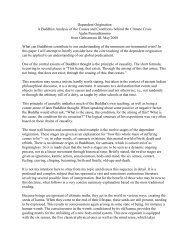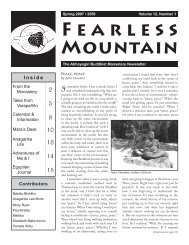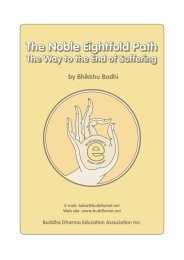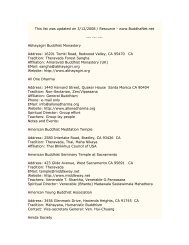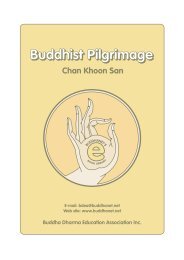- Page 1 and 2: King Asoka and BuddhismHistorical &
- Page 4: Buddhism / Indian History / Asian S
- Page 8 and 9: ContentsThe Contributors ..........
- Page 10 and 11: 3. The Gathering of the Relics ....
- Page 12 and 13: owing to the inability of certain s
- Page 14 and 15: 1Aśoka — The Great UpāsakaRICHA
- Page 16 and 17: Buddhism which Aśoka announced in
- Page 18 and 19: not only urges diligence on others,
- Page 22 and 23: e Aśoka, a layman, who tests monks
- Page 24 and 25: eousness can hardly have been Buddh
- Page 26 and 27: Notes1. P.H.L. Eggermont, The Chron
- Page 28 and 29: 2Aśoka and Buddhism as Reflectedin
- Page 30 and 31: elation to Brahmanism. There was ce
- Page 32 and 33: the correct doctrine. What is of si
- Page 34 and 35: is the nearest that we get in the i
- Page 36 and 37: days remains unclear unless the com
- Page 38 and 39: since he showed them the way and th
- Page 40 and 41: the importance of trade, the first
- Page 42 and 43: accordance with dhamma was preferab
- Page 44 and 45: in Kalinga, is interestingly omitte
- Page 46 and 47: was largely absent. The phrase that
- Page 48 and 49: That the larger corpus of edicts we
- Page 50 and 51: 3Emperor Aśoka and Buddhism:Unreso
- Page 52 and 53: to punish them for their crimes, so
- Page 54 and 55: Aśokan scholars since the 1830’s
- Page 56 and 57: Pandukabhaya had built them a resid
- Page 58 and 59: The Mahāmātras stationed at Kauś
- Page 60 and 61: The Sri Lankan Pali records, which
- Page 62 and 63: problem. Nor would there be a diffi
- Page 64 and 65: 17 th Gets concerned over indiscipl
- Page 66 and 67: to gratify ambition and enrich the
- Page 68 and 69: whose central theme is the conquest
- Page 70 and 71:
are altogether silent on a Kalinga
- Page 72 and 73:
All men are my children. Just as, i
- Page 74 and 75:
within his dominions. The frontier
- Page 76 and 77:
tendents of matters relating to the
- Page 78 and 79:
edicts addressed to the Saṅgha; a
- Page 80 and 81:
evidence of Aśoka’s own lithic r
- Page 82 and 83:
all these sermons could be describe
- Page 84 and 85:
ecords relating to Dharma, appointe
- Page 86 and 87:
the other peoples dwelling about th
- Page 88 and 89:
earlier, the creation of the new ca
- Page 90 and 91:
five Greek kings among themselves a
- Page 92 and 93:
gratitude, amounting at times to sh
- Page 94 and 95:
e inconsistencies begin to make sen
- Page 96 and 97:
onistically with a brahmin exponent
- Page 98 and 99:
3 rd ed. rev. (New Delhi: Governmen
- Page 100 and 101:
far been found, the latest being th
- Page 102 and 103:
made, it rendered subsequent steps
- Page 104 and 105:
its Culture, 2nd. ed. rev. (Colombo
- Page 106 and 107:
The central theme in the majority o
- Page 108 and 109:
on a statement made by I-tsing 5 th
- Page 110 and 111:
confused accounts of the Sanskrit S
- Page 112 and 113:
the Vinaya. Some of them tended the
- Page 114 and 115:
In the foregoing data we have two i
- Page 116 and 117:
Aśoka cannot be expected to decide
- Page 118 and 119:
and while Aśoka who meted out such
- Page 120 and 121:
(2) Aliyavasāni (P. Ariyavaṃsān
- Page 122 and 123:
to it as sambuddhasamayaṃ, “the
- Page 124 and 125:
5Aśoka and the Emergence of a Sinh
- Page 126 and 127:
5. the Mahābodhivaṃsa (10 th or
- Page 128 and 129:
3. The Mission to Sri Lanka: Brief
- Page 130 and 131:
was planted in the Mahāmegha Park
- Page 132 and 133:
disbelieve these events associated
- Page 134 and 135:
and he saw to it that his actions s
- Page 136 and 137:
at Kalinga, would have paid special
- Page 138 and 139:
missionaries to propagate the Buddh
- Page 140 and 141:
To the first question the answer is
- Page 142 and 143:
fore Mahinda Thera’s Buddhist mis
- Page 144 and 145:
and the countries they visited. 47
- Page 146 and 147:
order. 55 Their son Sumana was a me
- Page 148 and 149:
it to wither away. But Aśoka manag
- Page 150 and 151:
Notes1. G.P. Malalasekera, ed. Va
- Page 152 and 153:
ical and Social Studies, Vol. I, No
- Page 154 and 155:
6Images of Aśoka:Some Indian and S
- Page 156 and 157:
legends and stories that were told
- Page 158 and 159:
Sanskrit avadānas each have their
- Page 160 and 161:
who pointed out the honey store bec
- Page 162 and 163:
the Fierce — an appellation that
- Page 164 and 165:
the end of Aśoka’s life, it is o
- Page 166 and 167:
somewhat regained consciousness, he
- Page 168 and 169:
elics of the Buddha for redistribut
- Page 170 and 171:
the glory of Sri Lanka and on its p
- Page 172 and 173:
Secondly, related to this are the d
- Page 174 and 175:
It is clear, then, that this is a t
- Page 176 and 177:
how in the Aśokāvadāna these wer
- Page 178 and 179:
eborn as a god in one of the heaven
- Page 180 and 181:
the night, the guardian gods came t
- Page 182 and 183:
monarch bested by a nāga, nor, out
- Page 184 and 185:
as Japan were inspired to emulate i
- Page 186 and 187:
ConclusionWith this Lokapaññatti
- Page 188 and 189:
6. A.L. Basham, “The Rise of Budd
- Page 190 and 191:
y dint of his military power. This
- Page 192 and 193:
43. Strong, p. 192. Upagupta has al
- Page 194 and 195:
62. T.W. Rhys Davids, E. Carpenter,
- Page 196 and 197:
sequently carried on in the histori
- Page 198 and 199:
Aśoka remained largely a name in t
- Page 200 and 201:
of Jalauka’s name in other record
- Page 202 and 203:
the Sanskrit original is no longer
- Page 204 and 205:
Upagupta commanded immense venerati
- Page 206 and 207:
(5) His conversion to Buddhism is a
- Page 208 and 209:
whose noble fame travelled far and
- Page 210 and 211:
surrounded by a coating of inventio
- Page 212 and 213:
missionary role claimed by Aśoka i
- Page 214 and 215:
Aśoka and, by implication, these m
- Page 216 and 217:
of forbearance and light punishment
- Page 218 and 219:
from the pens of many an intellectu
- Page 220 and 221:
ascribed to Aśoka ideas and deeds
- Page 222 and 223:
the only scholar of the West to dis
- Page 224 and 225:
such a way that no heretical monks
- Page 226 and 227:
(2) that he used Buddhism — or ra
- Page 228 and 229:
in this by the fact that these sect
- Page 230 and 231:
of the land’s greatest moments in
- Page 232 and 233:
ecame infinitely more spiritual. Bu
- Page 234 and 235:
frontier areas as a reaction agains
- Page 236 and 237:
Present-day India has been so impre
- Page 238 and 239:
3. K.A. Nilakanta Sastri, Age of th
- Page 240 and 241:
y V. Sirinivasa Sarma (Delhi: Banar
- Page 242 and 243:
Pali et Traduction, L’Ecole fran
- Page 244 and 245:
I have drawn closer to the Sangha a
- Page 246 and 247:
The chronological constraints have
- Page 248 and 249:
MapsAśoka’s Indian Empire235


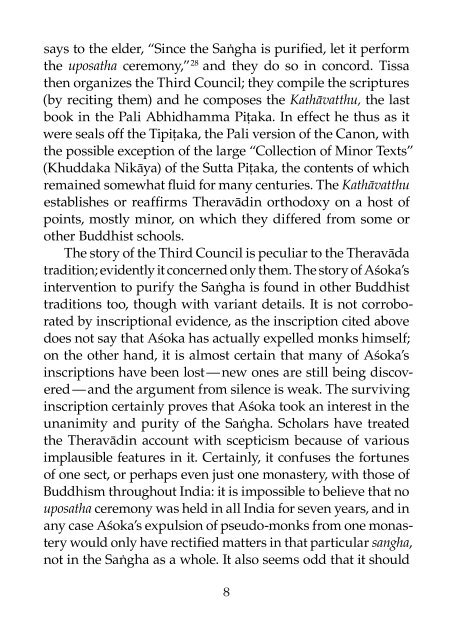
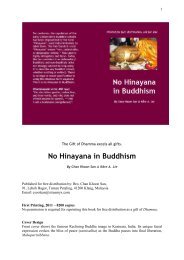

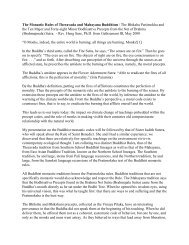
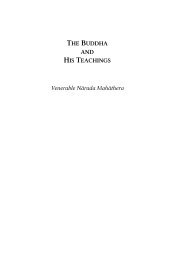

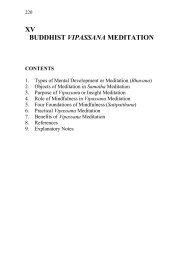

![Path of Freedom [Vimuttimagga] - Urban Dharma](https://img.yumpu.com/34050512/1/177x260/path-of-freedom-vimuttimagga-urban-dharma.jpg?quality=85)
